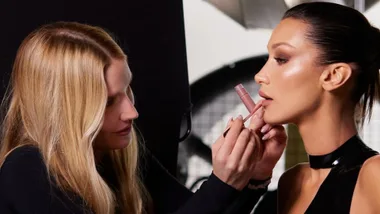Multi-level marketing (MLM) schemes promise the world but very rarely deliver. They lure distributors in by claiming they can earn five figures a month by working from home without any experience at all. In reality, 99 per cent of all MLM distributors lose money.
Dr Máire O Sullivan, a lecturer in advertising and marketing at Edge Hill University in the UK, calls them “legal” pyramid schemes. “Vulnerable people are being targeted by the allure of making easy money, fitting work around their own schedule, and entering a supportive community,” she says. “But some of these companies have an alarmingly cult-like mentality, they practise ‘love bombing’, and encourage you to cut off anyone who isn’t supportive of the MLM or has concerns about the business model. That is alarming and abusive behaviour.”
Here, five women open up about their experiences with MLMs, the moment they see saw the light and how they escaped…
NIKKI, 35, FORMER YOUNIQUE PRESENTER
Nikki first heard about the multi-level marketing scheme Younique in 2013 when the wife of her husband’s friend messaged her out of the blue on Facebook with “an exciting opportunity to join an amazing company and make money from home.” At the time, Nikki was living in a housing commission property, having left school in Year 10 and fallen pregnant at age 16. She couldn’t afford the $129 sign-up fee, so her husband’s friend’s wife paid it for her and told her all she had to do was sell some makeup on Facebook from home. The idea of working from home particularly appealed to Nikki because she has severe anxiety and rarely leaves the house – she is also the full-time carer of her husband who suffered a spinal injury at work and requires constant assistance. “I was really naïve. We were struggling financially, barely making it week to week, and I thought I was going to have what they would call a ‘high-end business’,” she says. “But it didn’t work out like that.” What was meant to be her golden ticket out of financial stress, became a living nightmare.
Despite no formal training, Nikki had some initial success with Younique and climbed to third-tier status after signing up 20 distributors underneath her. They were all strangers. Nikki was ordered to add 30 different people on Facebook a day. She was told to go through the Facebook Friends lists of her family members and add people she didn’t know; she was advised to randomly join Facebook groups and contact members, and to message people in Canada and Italy where Younique also operated. She was also told to cold call people and host online “parties” with her friends, hassling them to buy products and sign up as a distributor. “I found it really intrusive and felt uncomfortable doing it, which is probably why I didn’t get very far with it,” says Nikki, who was pressured by her upline to recruit more people. “I hated the forcefulness of it all.”
Unable and unwillingly to recruit more distributors, the harassment began. When Nikki told her upline that she wanted to leave, they repeated the worn-out order “you have to spend money to make money.” One of the top tier distributors in Australia then called Nikki directly and told her it was her fault she wasn’t making money because she wasn’t working hard enough. “I was absolutely disgusted in the treatment I received. It was horrible,” explains Nikki, who estimates she spent over $8,000 on Younique products, earning “next to nothing” back. The abuse was the last straw for Lawless who finally left Younique.

JAIME, 40, FORMER DOTERRA WELLNESS ADVOCATE
Jaime was lonely and sick of sitting at home on her own every weekend while her partner worked interstate when she was invited to an essential oils party on a Saturday night in January 2018. At the time, she jumped at the chance. Now, she wishes she’d stayed on the couch watching Netflix. “The woman who hosted the doTERRA party told me she gets all of her essential oils for free because she earns so much. She alluded to the fact that she travels overseas quite a bit for business and told me how much healthier her lifestyle is now,” explains Jaime, who works in the public hospital sector. “I got sucked in.”
The red flags started to appear when Jaime’s upline called her to ask how many products she had sold that month and started pressuring her to recruit – the same old story. Jaime was spending $500 a month on essential oils for 11 months (leaving her “broke” at times, and adding up to “thousands and thousands” of dollars), but it wasn’t until she had an adverse reaction to an oil blend that she called it quits. “I tried a new blend and it made me feel dizzy, nauseated and clammy. It frightened me, but when I contacted doTERRA, they just told me to send the product back,” recalls Jaime, voicing her concerns about untrained consultants selling potentially-harmful essential oils.
Jaime kept her doTERRA account a secret from her partner and still hasn’t told him about it or how much spent on it: “Looking back now, it was a waste of time and money, getting involved in a community that sells a fake lifestyle. I was conned.”
LAURA, 39, FORMER YOUNIQUE PRESENTER
Laura, 39, was living in the western suburbs of Melbourne with her husband and six-year-old daughter when a woman in an online mums group messaged her about Younique three years ago. “She told me it would be a good way to make friends and make extra money selling high-end makeup,” recalls Laura.
Instead of gaining a support network, Laura lost $6,000. But that wasn’t even the worst part. After two years with Younique – and having recruited 40 team members and hosted five in-home parties – Laura finally saw the scheme’s true colours when her husband developed a condition called surfer’s ear, which left him deaf and unable to work. With the loss of his income and the cost of surgeries, Laura says her family was in the worst financial situation they’d ever been in, unable to pay their bills or afford groceries. “It was a really stressful time. I think I’ve still got $15,000 of credit card debt from it,” she says. When Laura explained to her group leader that she couldn’t “hustle to sell another mascara” that month because of the stressful situation was in, the group leader told her to “just run a few more parties” to solve all of her problems. “That was the final nail in the coffin,” she says.
“I kick myself for being involved in it now. When my Facebook memories come up with Younique posts, I cringe,” says Laura, who has since apologised to her friends and family who tried to warn her about it being a “pyramid scheme.”
“When my account was deactivated, that was the best email I’ve ever received,” says Laura, who threw out all of her Younique make up. “Oh my god, it felt awesome.”
HANNAH, 32, FORMER YOUNIQUE PRESENTER
When Hannah first heard about Younique, she was drawn in by their sisterhood rhetoric. She was studying a Bachelor of Education and working part-time in a call centre last year when she signed up to become a Younique presenter – mostly for the heavily discounted introductory make up kit and the lure of making extra money to supplement her tight student budget. “It’s ironic that they get you to post a heap of memes about #bossbabes on Facebook; because it’s hard to feel like a boss babe when you’re not making any sales or money,” says Hannah, who spent $500 on products before being kicked out of her group for not making enough sales after six-months.
“The hardest part was being bombarded with messages 24/7 [from uplines]. If you didn’t do what they said, you were made to feel like you weren’t good enough because everyone else was doing it. It was like mental warfare,” reflects Hannah, who resorted to turning her phone off to avoid the constant demands and harassment. “If I was in a situation where I didn’t have university, a partner and other community groups like cosplay, I would have felt so awful about myself. Being told you’re not good enough multiple times a day could ruin some people.”
AMY, LATE 40s, FORMER SENGENCE CONSULTANT AND CURRENT MEMBER OF THE ANTI-MLM COALITION
Amy became a part of The Anti-MLM Coalition after a negative experience with SeneGence. She spent $11,000 on products in five months in 2017, before cutting ties with the “cult”. “I was involved in a religious cult in my youth and SeneGence started to feel very cult-like to me,” she says. “It was the same brainwashing, systems of control and influence.”
Now, Amy is one of the main members of The Anti-MLM Coalition, which has more than 6000 followers on Facebook and offers support for those personally affected by MLMs, and also lobbies for legislative change. Amy says they get regular messages from distressed loved ones who have lost their daughter/wife/friend to an MLM, looking for resources and advice. “Our main goal is education. We want to encourage people to look for the red flags and be sceptical,” she says. If it looks like a cult, sounds like a cult and feels like a cult, it’s probably a cult.
O Sullivan’s advice to women charmed by the promise of extra money and empowerment is to use critical thinking. “Nobody would say no to extra money, but be very careful if someone can’t provide hard numbers, a business plan or, in some cases, won’t tell you the name of the company,” she says. “Remember, 99 per cent of people in these businesses lose money.”
Read our full investigation into the cult-like world of multi-level marketing, in the January issue of marie claire. On sale now.
 Photography by Ilka and Franz
Photography by Ilka and Franz









